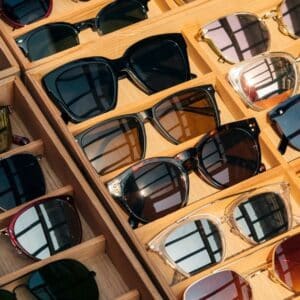The Benefits of Wearing Sunglasses
Wearing sunglasses has several benefits for the eyes, including:
- Protection from UV rays: Sunglasses protect the eyes from harmful ultraviolet (UV) rays, which can cause damage to the retina and increase the risk of cataracts and other eye problems.
- Reduced glare: Sunglasses can reduce glare from the sun, making it easier to see and reducing eye strain.
- Improved visual acuity: Wearing sunglasses can improve visual acuity, making it easier to see in bright light conditions.
- Better vision in the snow or water: Sunglasses can also improve vision in the snow or on the water by reducing the glare caused by reflections.
- Stylish: Sunglasses can be stylish and can enhance an individual’s look.
Not all sunglasses provide the same level of UV protection, so it’s essential to look for sunglasses that block 99-100% of UV rays.
How to Choose the Right Sunglasses For You
Here are some factors to consider when choosing sunglasses:
- UV protection: Make sure the sunglasses you choose block 99-100% of UVA and UVB rays.
- Lens color: Different lens colors can enhance contrast and reduce glare in different lighting conditions. Gray and green lenses are suitable for general use, while brown lenses are good for driving.
- Lens shape: The shape of the lens can affect the amount of light that enters the eye. A larger lens shape will provide more coverage and protection.
- Frame style: The style of the frame can affect the fit and comfort of the sunglasses. Try several different styles to see which one feels most comfortable and secure on your face.
- Fit: Make sure the sunglasses fit well and stay securely on your face, especially when you’re active. A good fit will also prevent light from entering from the sides.
- Purpose: Consider what you will be using the sunglasses for. Choose a more durable and lightweight frame if you are using them for sports or other outdoor activities.
- Prescription glasses: If you need prescription glasses, you can get prescription or clip-on sunglasses to put on top of your regular glasses.
Ultimately, the most important thing is that you feel comfortable wearing the sunglasses and that they provide the level of protection you need.
Tips for Choosing the Right Frame Shape and Size
Choosing the right frame shape and size can help ensure a comfortable and secure fit and complement your facial features. Here are some tips for choosing the right frame shape and size:
- Face shape: The frame shape should contrast the shape of your face. If you have a round face, choose square or rectangular frames to make your face appear longer. If you have a square face, choose round or oval frames to soften your features.
- Proportion: The frame size should be proportionate to your face size. A larger frame will be more suitable for a larger face and a smaller one for a smaller one.
- Bridge fit: The bridge of the glasses should fit comfortably and securely on the nose. Test different frames to see which one feels the most comfortable.
- Temple fit: The glasses’ temple (or arm) should fit snugly behind the ear without causing discomfort.
- Lens size: The lens size should be appropriate for your face size and frame shape. A larger lens size will provide more coverage and protection but may not be suitable for smaller faces.
- Try on: Try on different frames to see which feels the most comfortable and secure on your face. You should feel confident in your choice, and it should enhance your look.
Ultimately, the most important thing is to find a frame shape and size that feels comfortable and secure and complements your facial features.
How to Properly Care for Your Sunglasses
Proper care for your sunglasses can help extend their life and maintain quality. Some tips for properly caring for your sunglasses:
- Clean the lenses regularly: Use a microfiber cloth or a lens cleaning solution to gently wipe away dirt, dust, and fingerprints from the lenses.
- Handle them carefully: Avoid dropping or scratching your sunglasses, and don’t put excessive pressure on the frames.
- Store them properly: When not in use, store your sunglasses in a protective case to protect them from scratches and damage.
- Avoid leaving them in extreme temperatures: Excessive heat and cold can damage the frames and lenses of your sunglasses.
- Don’t leave them in your car: The extreme temperatures inside can damage your sunglasses.
- Avoid using household cleaning products: Some cleaning products can damage the lenses or frames of your sunglasses.
- Repair them when needed: If your sunglasses are damaged or broken, take them to a professional for repair or replacement to ensure their longevity.
- Keep regular check-ups: if you use your sunglasses regularly. For extended periods, it’s a good idea to have them inspected by an eye care professional to ensure they are still providing proper UV protection.
Following these tips can help you prolong the life of your sunglasses and ensure they continue to provide the protection and style you expect.
What Brand of Sunglasses Is Best?
It’s difficult to determine the best brand of sunglasses as it largely depends on personal preference and the features you are looking for in a pair of sunglasses. However, some well-known and reputable brands that are known for their high quality and craftsmanship include:
- Ray-Ban: Known for its iconic styles, such as the Wayfarer and Aviator, Ray-Ban has been a famous brand for decades. They offer various styles for men and women and use high-quality materials in their frames and lenses.
- Oakley: This brand is known for its sporty and durable sunglasses, which are popular among athletes and outdoor enthusiasts. They use cutting-edge technology in their lenses, such as polarized and photochromic lenses, to enhance visual clarity and protect eyes from glare and UV rays.
- Maui Jim: This brand is known for its polarized lenses, designed to reduce glare and enhance the colors of the natural world. They offer a wide range of styles for both men and women and use high-quality materials in their frames.
- Persol: This Italian brand is known for its timeless and classic styles and use of high-quality materials and craftsmanship. They are mainly known for their folding sunglasses, a popular choice among celebrities and fashion-conscious individuals.
- Gucci, Prada, and Dior: These luxury brands offer high-end, premium quality and craftsmanship and are known for their stylish and innovative designs. They use high-quality materials and have a wide range of styles, from classic to modern.
- Warby Parker, Knockaround: These affordable brands are known for their stylish options and affordable prices and also have a socially conscious approach like the “buy a pair, give a pair” program.
It’s important to note that the best brand for you will depend on your style, the features you are looking for, and your budget. It’s always recommended to read reviews, compare prices, and try on different models to find the perfect pair for you.
Are Cheap Sunglasses Good?
Cheap sunglasses can vary in quality, and it’s essential to know that the price of a pair of sunglasses is only sometimes indicative of their quality.
Some cheap sunglasses may be made with lower-quality materials and may not provide adequate UV protection. They also may last less long or be as durable as more expensive options. On the other hand, some affordable sunglasses brands, such as Warby Parker, Knockaround, and others, are made with high-quality materials, provide good UV protection, and have stylish designs comparable to more expensive options.
Generally, it’s essential to consider the features and quality you are looking for in a pair of sunglasses, not just the price. It’s better to invest a little more in a pair of high-quality sunglasses that will provide proper protection and last longer than to keep buying cheaper pairs that may not provide adequate protection and may not last as long.
Is it OK To Wear Sunglasses A Lot?
Wearing sunglasses regularly can help protect your eyes from harmful UV rays and glare, which can cause eye strain, fatigue, and even long-term damage, such as cataracts and macular degeneration.
It’s vital to wear sunglasses when you’re spending time outdoors, especially on sunny days or when you are near reflective surfaces such as water, sand, or snow.
However, it’s important to note that wearing sunglasses all the time can also have some downsides. Wearing sunglasses indoors or in low light conditions can make it difficult to see and may even cause eye strain.
Additionally, if you’re wearing sunglasses that are too dark, they can cause your pupils to dilate, which can make it difficult to see in dim light.
It’s best to choose sunglasses appropriate for the light level and adjust them accordingly. For example, polarized sunglasses are great for reducing glare and protecting your eyes from the sun, but they can be too dark to wear indoors or at night.
It’s also a good idea to check your eyes regularly with an eye doctor, especially if you wear sunglasses for extended periods, to ensure your eyes are healthy and provide adequate UV protection.
Overall, it’s beneficial to wear sunglasses regularly to protect your eyes from harmful UV rays. Still, it’s essential to wear the appropriate sunglasses for the light level and adjust them accordingly.
When Should You Not Wear Sunglasses?
While sunglasses can protect your eyes from harmful UV rays and glare, there are some situations when it’s not appropriate or safe to wear. Here are a few examples:
- Indoors or in low light conditions: Wearing sunglasses indoors or in low light conditions can make it difficult to see and may even cause eye strain. It’s best to remove your sunglasses when you’re inside or when the light is dim.
- While driving at night: Wearing sunglasses can make it difficult to see and can be dangerous when driving. It’s best to remove your sunglasses when you’re driving at night or in low-light conditions.
- While using a computer or other electronic device: Wearing sunglasses while using a computer or other electronic device can cause eye strain and can make it difficult to see the screen. It’s best to remove your sunglasses when you’re using electronic devices.
- Certain activities require precise color recognition: Some activities, such as hunting, fishing, or identifying colors on maps and charts, require the ability to see accurate colors, so it’s best not to wear sunglasses during these activities.
- If you have a medical condition: If you have a medical condition that affects your eyes, it’s essential to consult your eye doctor before wearing sunglasses.
It’s also important to note that not all sunglasses provide the same level of UV protection, so it’s vital to choose sunglasses that are UV400 rated, which is the highest rating that can protect your eyes from both UVA and UVB rays.
While wearing sunglasses can protect your eyes, it’s essential to remove them in situations where they can be dangerous or make it difficult to see or when other specific needs arise.
Do Sunglasses Weaken Your Eyes?
Wearing sunglasses can help protect your eyes from harmful UV rays and glare, which can cause eye strain, fatigue, and even long-term damage, such as cataracts and macular degeneration.
However, it’s important to note that wearing sunglasses that are too dark can cause your pupils to dilate, making it difficult to see in dim light. This can cause eye strain, but it is not weakening your eyes.
It’s best to choose sunglasses appropriate for the level of light and adjust them accordingly. For example, polarized sunglasses are great for reducing glare and protecting your eyes from the sun, but they can be too dark to wear indoors or at night.
Additionally, if you’re wearing sunglasses that do not provide adequate UV protection, your eyes may be exposed to harmful UV rays, which can cause long-term damage. It’s important to choose sunglasses that are UV400 rated, the highest rating that can protect your eyes from UVA and UVB rays.
It’s also a good idea to get your eyes checked regularly by an eye doctor, especially if you wear sunglasses for extended periods, to ensure your eyes are healthy and provide adequate UV protection.
In summary, sunglasses protect your eyes from harmful UV rays and glare. Still, it’s essential to choose appropriate sunglasses for the level of light and to ensure they provide adequate UV protection to avoid any negative effects on your eyes.
Do Sunglasses Make You Look More Attractive?
Sunglasses can be a stylish accessory that can enhance one’s appearance and make one look more attractive. Sunglasses can make a person look more mysterious, confident, and sophisticated. However, it’s important to note that attractiveness is subjective, and what one person finds attractive may not be the same for another person.
It’s also important to choose sunglasses that suit your face shape and personal style. The right sunglasses can complement your features and enhance your overall look, while the wrong ones can look out of place or unflattering.
It’s also important to note that while sunglasses can be a stylish accessory, they are primarily designed to protect your eyes from harmful UV rays and glare. So, it’s important to choose sunglasses that provide adequate UV protection and make sure you wear them in appropriate situations.
In summary, sunglasses can be a stylish accessory that can enhance one’s appearance. Still, it’s important to choose sunglasses that suit your face shape and personal style and provide adequate UV protection.
Conclusion
Sunglasses are an essential accessory that can protect your eyes from harmful UV rays and glare while also being a stylish accessory that can enhance your appearance.
When choosing sunglasses, it’s essential to consider the features and quality you are looking for, as well as your style and budget. It’s also important to choose sunglasses that provide adequate UV protection and to wear them in appropriate situations.
Additionally, it’s good to have a regular check-up by an eye doctor, especially if you wear sunglasses for extended periods, to ensure your eyes are healthy and your sunglasses provide adequate UV protection.






